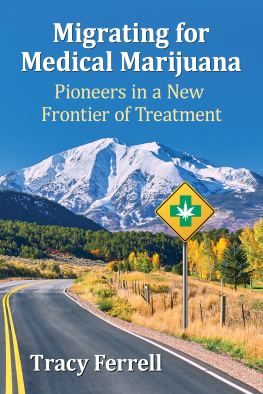
Migrating for Medical Marijuana
Pioneers in a New Frontier of Treatment
TRACY FERRELL

Jefferson, North Carolina
LIBRARY OF CONGRESS CATALOGUING DATA ARE AVAILABLE
BRITISH LIBRARY CATALOGUING DATA ARE AVAILABLE
e-ISBN: 978-1-4766-3723-5
2019 Tracy Ferrell. All rights reserved
No part of this book may be reproduced or transmitted in any form or by any means, electronic or mechanical, including photocopying or recording, or by any information storage and retrieval system, without permission in writing from the publisher.
Front cover images 2019 Shutterstock
Toplight is an imprint of McFarland & Company, Inc., Publishers

Box 611, Jefferson, North Carolina 28640
www.toplightbooks.com
To the thousands of patients and their families using cannabis to treat their ailments, especially those who were kind enough to speak with me for this book. Your bravery in facing down the law and the medical establishment to find a treatment or cure is an inspiration.
You cannot make a war against drugs without knowing that, doing so, you are making a war against people.Ruth Driefus, former president of the Swiss Confederation
Acknowledgments
This book would not have been possible without the assistance of many people. First and foremost, thank you to the patients, doctors, researchers, growers and activists who agreed to be interviewed and spoke with me at length, often revealing very personal information. I appreciate you sharing your stories in the hopes of changing the situation of medical marijuana. A special thank you to Amy Dawn Bourlon-Hilterbran, founder of American Medical Refugees, for welcoming me into the group and helping me connect with patients from around Colorado.
Thanks are also owed to the many friends and colleagues who gave advice on early chapters. Thanks to Priya Jha, Debbie Abbott, Kevan Brown, Mark Bunster, Carol Conzelman and Daniel GoldsteinI really appreciate your feedback. My appreciation to Amy Hayes for your expert help with graphs and images. Also, thank you to Leland Rucker for profiling my research and providing valuable contacts in the cannabis community.
Finally, thanks to my family. To my daughter, Lola, thank you for understanding when, for three years, I was always busy on my book. To my husband, Tim Zych, I appreciate that you always believed in this project. Thank you for reading early drafts, giving feedback, and most importantly, urging me on even in my moments of doubt. I couldnt have done it without you.
Preface
I can clearly remember the first time I smoked marijuana. It was the summer before my senior year of high school. I was 16 years old. A friend and I had traveled to the beach with my family, and we had met some vacationing teenage boys. They were having a party at their hotel room one night and invited us over. One of the guys said he had a little bit of pot and asked me if I wanted to smoke some. Always open to new experiences and wanting to look cool, I quickly agreed. The two of us walked from the hotel down to the beach; my friend stayed behind with the others. He also was in high school and didnt even have a smoking implement, so he made a pipe out of a Coke can. I have to admit that the experience was a bit of a letdown. I wasnt sure what I was doing, and the weed was pretty badI barely felt a buzz from it. But I wasnt turned off from trying it again, and I would continue to smoke sporadically throughout the rest of high school and college, eventually buying a pipe of my own and learning to tell the good weed from the bad.
However, it wasnt until I moved to Colorado in 1993 that I became more of what people would call a stoner. I started dating someone who grew his own marijuana (still illegal at the time, of course) and began to smoke more regularly. My collection of smoking implements grew to include two bongs. I learned the difference between indica and sativa strains (the former is generally more sedating and the latter more uplifting), and I came to understand more about the plant in general. While marijuana was illegal in Colorado at that time, Boulder was definitely a stoners town and the police generally looked the other way when it came to pot smoking. Most of the people I knew smoked weed, and I thought little about the fact that, as a successful teacher and PhD candidate, I did not fit the stereotype of the typical marijuana user. I would continue to use marijuana after I graduated and got a job as a professor and after I settled down, got married, bought a house, and started a family. Eventually, I designed a course about the politics of drugs and learned more not just about marijuana but also about the drug war in general. I became an expert on the drug that had always been a normalized part of my adult life long before its legalization and destigmatization.
So why am I telling you the brief history of my marijuana use in a book about medical marijuana patients? Well, the fact is that despite knowing far more than the average American about cannabis, I was nonetheless surprised when I started doing research for this book. I had long thought of marijuana as a relatively harmless drug. It might make you slightly sleepy or unmotivated or give you a bit of a smokers cough, but it was nowhere near as dangerous as alcohol. Additionally, I was aware that it had some medical benefitsprimarily pain relief. Still, I bought into a lot of the misconceptions around medical marijuana, believing that the medical movement was primarily a gateway to recreational legalization. I also thought that most medical patients were getting cards only to use the drug recreationally and that it certainly couldnt have all the miracle medical benefits that some proponents claimed. Despite years of use and research, I dont think I really took cannabis as a medicine all that seriously.
That all changed when I started hearing the firsthand stories of families who had moved to access medicinal marijuana. While it might be easy to discount a few anecdotal accounts, interviewee after interviewee regaled me with stories of near miracle cures. Sure, there were a few patients who did not have the hoped for response to cannabis, but not one of the dozens of people I interviewed recounted a negative reaction to the drug. Alternatively, I heard stories of children who went from near vegetative states to sitting up and talking. Kids confined to wheelchairs were suddenly able to walk. Patients whose organs were shutting downwho were on the verge of deathhealed and went into remission. Veterans who had been completely incapacitated by post-traumatic stress disorder (PTSD) and anxiety were able to live almost normal lives. Others whose lives were hampered by chronic pain or depression or fatigue suddenly could reenter everyday life again. While each story seemed almost too good to be true, taken as a whole they could not be ignored. This drug is powerful, and more and more patients are discovering that power.
This book tells the story of some of the pioneers in the field of medical marijuanadoctors, growers, activists, and, most especially, patients. Because I am based in Colorado, my research primarily focuses on the cannabis community here, particularly those who have moved here to access the drug. Colorado is not the first or the largest state to legalize medical marijuana, but it has served as a beacon for many from throughout the country and world who are seeking better and alternative treatments in the form of the marijuana plant. In the chapters that follow I attempt to elucidate why that is, how Colorado came to be that place, and what others states could do or are doing to follow suit. Additionally I address the practicalities of medical marijuana uses, policy, research and whether or not moving to access marijuana is the right answer for patients. The politics around cannabis are uncertain and changing fast. Let this book be not only an archive of patients stories but also a snapshot of a time and place and people that can serve as a template for those who follow.
Next page








